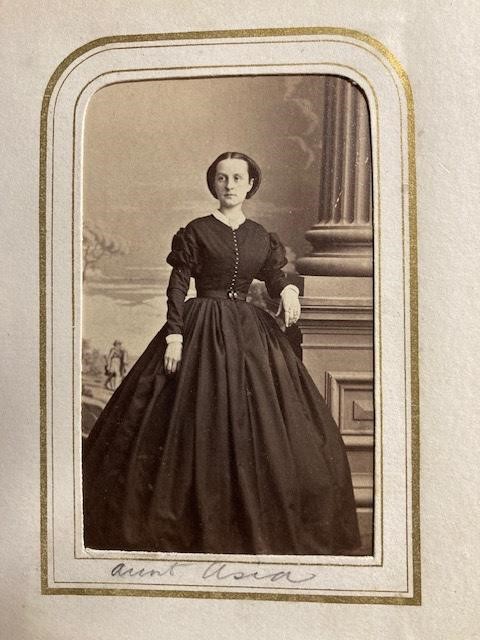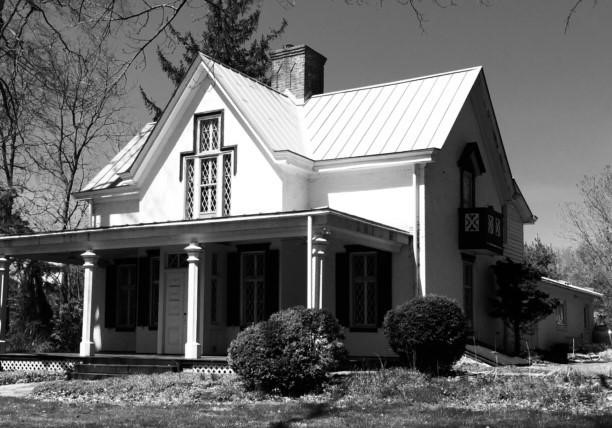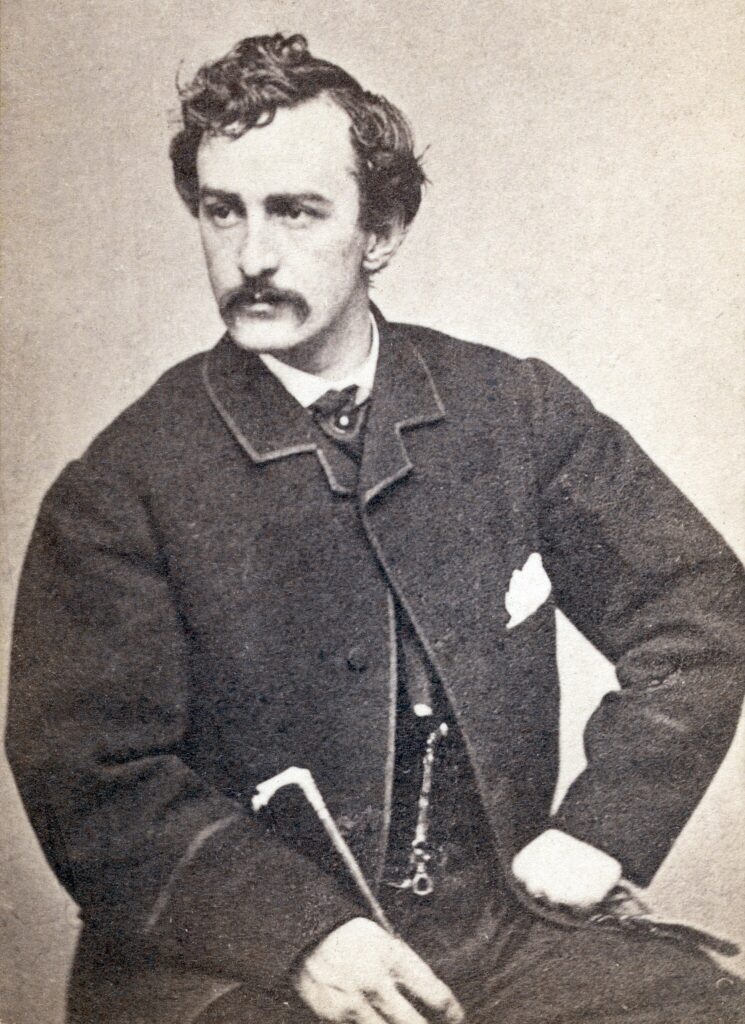Asia Booth Clarke, Sister to John Wilkes Booth: A Woman of the Civil War
ECW welcomes guest author Lisa Samia.
“So runs the world away”[1]
It was these five words placed at the very end of the memoir of John Wilkes Booth by his sister, Asia Booth Clarke, that captured the heartache and heartbreak of a woman, who because of her brother’s crime, became a woman of the Civil War. Not from a direct action of a Civil War battlefield, but from a single derringer shot that plunged Asia into a lifetime of loss, sadness, and anguish.
What does Asia mean by “So runs the world away” from Hamlet Act 3, Scene 2 and why did she choose this line to end her memoir of her brother John? Of all the lines in Shakespeare and all tragedies, she uses this one. The full line reads, “for some must watch while some must sleep, so runs the world away.”[2] The actual significance of the line is “some must stay vigilant and alert yet some remain carefree.”

Perhaps it is that in the end not only did John create the greatest of all American tragedies, but he became an American tragedy himself. And because of her brother’s crime, she became an American tragedy as well. These five words of Shakespeare describe the haunting reality of Asia’s inner turmoil that belied a life that was at one time content, yet became shrouded in grief. Like so many, she was a woman molded by the Civil War. But that is just part of her life. Through her writings, it was her belief in her faith, and her love of family that resonate from the past to today.
The life of Asia Booth Clarke is relatively unknown. For all her writing as the Booth family chronicler, poet, and playwright, she was also a daughter, wife, mother, and sister to John Wilkes Booth. She became collateral damage to her brother John’s crime of assassinatig President Abraham Lincoln.
Asia’s life began on November 20, 1835, in the log cabin home and farm in the small hamlet town of Bel Air, Maryland. Ten children were born to the great actor and tragedian Junius Brutus Booth and his wife Mary Ann Holmes Booth; only six reached adulthood. It was many months before the Booths chose a name for the child, being undecided “whether to call her after the accomplished young actress Sydney Cowell (Mrs. Bateman), who was a great favorite of Mr. & Mrs. Booth, or Ayesha, in recollection of one of Mahomet’s wives.” At length, Junius wrote to his wife Mary Ann, “Call the little one Asia in remembrance of that country where God first walked with man, and Frigga because she came to us on a Friday,” the day consecrated to the Norse goddess who presided over marriage and the home.”[3] She was about two and one-half years older than her brother John Wilkes.
Asia wrote many letters to her lifelong Baltimore friend Jean Anderson. From her early writings, we see a young Asia caught up in the girlish renderings of a life full of country visits and gossip. The letters describe her marriage to theater manager John Sleeper Clarke in Philadelphia in April 1859, and the cryptic warning John Wilkes whispered to her about her groom on her wedding day, a warning that later in life Asia grievously acknowledged. “Always bear in mind that you are a professional stepping-stone. Our father’s name is a power-theatrical in the land. It is dower enough for any struggling actor.”[4]
Asia’s life was forever changed after the assassination of President Lincoln on April 14, 1865. She was at the time expecting her third child and promised her brother John Wilkes she would name her child (if a boy) after him, but of course, that was impossible after his most heinous crime. She gave birth on August 20, 1865 to twins, a boy she named Creston and a girl named Lillian. She lost her little Lillian just one year later. This was the first of many losses experienced related to her children.
The year after the assassination, Asia published her first of three books, Booth Memorials: Passages, Incidents, and Anecdotes in the Life of Junius Brutus Booth (The Elder.) about the life of her famous father.
In 1868 Asia and her husband John moved to Europe to escape the horrible memory of her brother’s crime. She spent the next twenty years in Europe, never to return to the United States. In those years, she continued to write to her friend Jean Anderson and Sister Theresa Sewell, her former teacher from the Carmelite Convent in Baltimore, Maryland, where she had once attended. Asia revealed her thoughts and feelings about the Catholic faith and her children to Sister Theresa. In one letter, she shared the date of her confirmation into the Catholic Church and her confirmation name, Ignatia. The name derives from Latin, means ‘Fiery One,’ and denotes one who has strong will.
While residing in the French town of Boulogne Sur Mer, she wrote her second book, a Memoir on John Wilkes Booth by his Sister Asia Booth Clarke, in 1874. Through a sister’s heart, Asia poignantly portrays the early life of her brother while growing up together as teenagers from 1852-1856 at the Booth family farm in Bel Air called Tudor Hall, a one-and-a-half-story Gothic Revival home. Their father Junius passed away in 1852, and as the eldest son at home, John took up the responsibility of caring for his family, (not very successfully) at the age of fourteen. While this memoir was written from her recollections and bits of material Asia took with her to Europe, it is not a day-by-bay verbatim diary. However, she paints incidents of teenage antics and their time together on the farm that bound them closer. They shared their love of poetry, music, and riding, and it was Asia who helped her brother learn the great soliloquies of Shakespeare for, of course, John would follow the family vocation and become an actor.

The prolific words of John Wilkes resonated throughout Asia’s life in Europe with the growing difficulty of her marriage. “I loved my brothers devotedly, but Wilkes had grown nearer in those late years at the farm, where we were lonely together. My marriage, which he often urged me to free myself from; was becoming less pleasing to him, this and his professional pursuits separated us at long intervals.”[5]
Asia and John Sleeper had nine children. In 1882 her eldest son, Edwin who was in the British merchant fleet, was lost at sea. He was just twenty years old, and his body never found. Only four of their children reached adulthood.
In between these times, she wrote to her brother Edwin to share her growing grief, sadness, and disillusionment within her marriage. On June 3, 1879, she wrote about her husband, “…. how he hates me the mother of nine babies, but I am a Booth that is sufficient.”[6]
Her final book was published in 1882, this one called The Elder And The Younger Booth about her famous father Junius and brother Edwin.
Asia died in 1888 at the age of 52 in Bournemouth, England. Present were her husband John, her children Adrienne, Creston, and Wilfred, and daughter Asia, her husband Rhys Morgan, and their little daughter Ethel May.[7]
Her life after the assassination was one riddled with grief and loss not just for her own family, but for the Booth family as well. Of course, she condemned John’s actions, but she still loved him. When she wrote the memoir of her brother John, she wrote it in secret and hid it from her husband. He blamed the Booth family and even Asia for his problems, so Asia knew she had to hide her manuscript. Before she died, she gave it out of the family to have it published at some “future time,” which it was, but not until 1938. It was given the title The Unlocked Book a Memoir of John Wilkes Booth by his sister Asia Booth Clarke.

Upon Asia’s death in 1888, she secured from her brother Edwin and daughter Asia to be buried in the Booth family plot in Greenmount Cemetery, Baltimore, Maryland. This act signifies a testimony of an extraordinary unwritten statement of love as she rests with her family and just steps away from her brother John, who is also buried there in an unmarked grave.
A woman of the Civil War, she suffered a lifetime of collateral damage due to her brother’s crime. The five words from Shakespeare that ended her memoir of her brother John, “so runs the world away,” were bitter fruit in trying to explain what was in her heart that was and always would be unexplainable.
Lisa G. Samia is an Award-Winning Poet & Author who researches, writes, and lectures on American Civil War History. Her latest accomplishments are being selected as the National Parks Arts Foundation’s Artist in Residence for Gettysburg National Battlefield Park 2020 & National Parks Service’s Artist in Residence for Manassas National Battlefield Park 2021, both for her Civil War Poetry.
Endnotes
[1] Asia Booth Clarke, The Unlocked Book A Memoir of John Wilkes Booth By His Sister Asia Booth Clarke (G.P. Putman’s & Sons, New York, 1938), 141; William Shakespeare, Hamlet, Act 3 Scene 2.
[2] Clarke, The Unlocked Book, 141; William Shakespeare Hamlet, Act 3 Scene 2.
[3] Asia Booth Clarke, The Elder and The Younger Booth (Boston: James R. Osgood, 1882) 95-96.
[4] Clarke, The Unlocked Book, 110-111.
[5] Ibid, 136.
[6] Asia Booth Clarke to Edwin Booth, June 3, 1879, The Players Foundation for Theater Education, New York, New York.
[7] From the Heritage Team, Bournemouth Library, Bournemouth Visitor Guide May 16, 1888 (microfilm).
Excellent profile of the tragic figure, Asia Booth Clarke. And for those with an interest in the Lincoln Assassination, Asia’s writings reveal details of her brother, John, and his involvement in clandestine activities not to be found anywhere else.
Thank you Mike!
Well done Lisa!
Thank you AQ!
If you have an opportunity to listen to a lecture on Asia Booth Clarke by Lisa Samia, or hear read and discuss her award winning poetry, you will not be disappointed, Ms. Samia is an impassioned writer and interpreter of those unnamed people of the Civil War.
Thank you, Andrea!
I appreciate this interesting article! I like to know more about the “collateral damage” Asia suffered as a result of JWB’s crime.
Following John Wilkes Booth’s confirmed involvement in the assassination of President Lincoln, John Sleeper Clarke turned over a letter written by JWB to a newspaper: its publication led to Clarke’s arrest and confinement in 1865. The episode rattled John Sleeper Clarke; his marriage to Asia became strained; the departure from America appears to have been an attempt at “a fresh start” …that ultimately did not work for Asia and John. Clarke’s career thrived, but the bond to Asia became what can best be described as “a loveless marriage.”
Thank you, Mike, for adding these comments regarding the direct effects on Asia’s marriage! It’s been interesting to learn about the wider Booth family tragedy.
thank you Lisa for this wonderful essay … i am reminded of another sad story of a woman of the Civil War — John Brown’s widow, Mary Ann Day Brown.
Thank you Mark!
As with ALL of Lisa’s writings, I can not get enough. Such a talented and great writer. I look forward to reading more about Asia.
Thank you for this Lisa!
Thank you Tina!